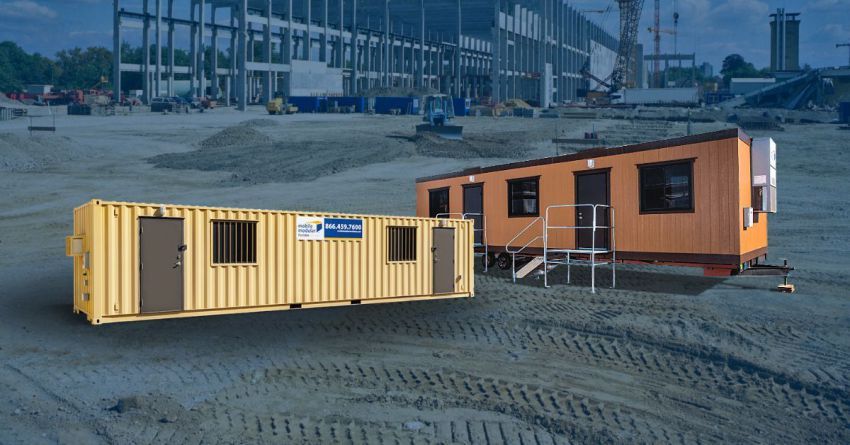- Rent, Lease, or Purchase
- |
September 23, 2021
Shipping Container Windows
Upcycling used containers has become a popular architectural trend in recent years. Today, people commonly modify, transport, and transform these cost-efficient cargo containers into highly functional and aesthetic buildings. They are also available in a wide range of sizes, so you can create different types of spaces depending on your needs.
A shipping container's versatile and modular build allows you to add customized doors and windows and even stack multiple units together to create more space.
You can also add other accessories like shelves, air-conditioning units, phone and data access lines, etc.
Let’s take a closer look into adding windows to your container home, office, or commercial building. In this article, we’ll explore the different types of shipping container windows available, their associated costs, and other details surrounding the installation process.
How Can You Install Windows in Shipping Containers?
There are two ways to install a window inside your unit:
- Do-It-Yourself (DIY)
- Solicit the help of a container modification specialist
Naturally, the cost and time involved in both processes differ. Although the DIY route may cost less, it can be tedious, time-consuming, and require technical proficiency.
If you are not adept at operating hand and power tools, we recommend consulting a professional. A lack of skills and experience in operating power equipment can lead to safety hazards.
Listed below are a few steps to follow for DIY shipping container window installation:
The DIY Process
To begin, you need to identify the way you intend to use your storage container. This will help determine the amount of natural light you'll need, air-conditioning outlets, frequency of opening the windows, etc.
Once you figure out how many windows you need, you need to decide where they will be positioned on the container wall. This step is crucial, as windows also play an essential role in improving ventilation, aesthetics, and accessibility.
Improper window openings can also lead to excessive build-up of heat and moisture inside the container, putting tremendous pressure on your air-conditioners and considerably increasing your energy costs.
Things You'll Need:
- Marker
- Measuring Tape
- Saw with metal bits, or power cutting blades
- Square wooden or steel tubes ( 2 x 4 inches cross-section): 4 nos.
- Screws/ Roofing nails
- Window
- Circular saw/jig with metal blades
- Grinder
- Hammer
- Drill
- Caulking
Steps:
- Start with measuring the size of the window. Note it down, as you'll need to cut out a similar opening.
- Mark the area where you'll install the window with a marker. You'll have to assess the width and height of the container to determine and locate an appropriate position. Understanding shipping container dimensions beforehand can help save time.
- Next, you need to construct the window frame that'll hold your window and allow the opening and closing of windows.
- Use the 2 x 4 inches steel tube or wood to cut out the frame that will accommodate the window. The length of the tube you'll need is approximately equal to the width of your window.
- Similarly, cut out a piece equal to the length of the window.
- The four steel tubes (two for the width and two measuring the length) form the metal frames.
- Use a circular saw or a power cutter to cut out the window opening. To simplify the process, you can first mark the location. You can use a masonry-bit drill to pre-drill holes. Alternatively, you can use tin snippers to cut the frame.
- If there are sharp edges on the frame, use a grinder to blunt them out.
- Screw or nail the steel frames at the window opening on the wall.
- Lift the window to the opening and fix the windows to the steel frame.
- Ensure that the window is in place. Secure each corner with roofing nails. If you find any loose ends, use additional nails to fix the window.
- Finish the process with a layer of caulking to close the small openings or leaky areas.
Here's a tutorial video that explains the steps for installing a window in a shipping container home.
Professional Help
Shipping container providers offer pre-built units with fully functional container doors, windows, and the accessories you'll need. If you require a custom design, you can consult a professional who can bring your ideas to life.
Cost of Installing Shipping Container Windows: DIY vs. Professional Costs
If you decide on a DIY approach, you can buy all the components required for your window individually or purchase a window installation kit for a storage container. These kits contain the exact-sized parts you'll need for your window. However, there's not much flexibility if you want to modify the design.
A 4-inch wide roll window kit costs approximately $500 per unit. Sliding windows with security bars (36" x 36") size costs about $450. If you want these kits installed professionally, you may have to shell about $300-$400 extra.
The DIY path will also help you save on installation costs.
If you're buying the individual items separately, a small 32" x 14" window may cost you anywhere between $100-$200. You’ll also need to factor in the cost of steel tube frames, screws, and caulking material. Using wooden frames instead of steel tubes can reduce the overall price, though steel is much sturdier.
What Are the Types of Windows You Can Install In a Shipping Container?
There are several window options for different use cases. For instance, shipping container homes require large windows for more natural light, while commercial enterprises may require windows with security bars. The shape, size, and window frame for each of these types will vary accordingly.
Popular shipping container windows include:
Privacy Window
Some structures require lots of natural light but they cannot accommodate extra-large windows for reasons related to privacy.
In that case, a privacy window can serve as an excellent option. These windows sit well above eye level, near the ceiling, or just below the shipping container roof. Privacy windows bring in more light to the storage container without allowing passersby to see through the glass.
Burglar Bar/Security Bar Window
Thanks to their heavy-duty construction, shipping containers offer a secure space. However, windows can create vulnerabilities. If you're storing valuable inventory or sensitive documents, you can install burglar bar windows to prevent theft, tampering, and vandalism.
These windows can also help your staff feel safe and comfortable inside the container, especially if you're using containers as ticket booths, guard shacks, etc.
Extra Large Windows
Extra-large shipping container windows are ideal for supervisor offices, facility rooms, and storefronts. A large window allows a facility manager to oversee their site and adds to the container's aesthetics.
Shipping Container Doors With Sliding Glass Windows
If you do not have sufficient space to open or close a door in front of the container, you can use sliding doors that double as windows. Retail offices, homes, and display areas generally lean on this solution. In addition to allowing more light in, they also help create a more inviting entrance.
Concession Window
You can rely on concession windows when converting a shipping container into a pop-up café or coffee shop to provide a larger service area. You can also add rolling shutter doors that you can lock after service.
Windows With Blinds
Cut out an open space equivalent to the size of the window frame to use blinds instead of steel windows. Windows with blinds are cost-effective and help diffuse light entering the space. They also help create a more pleasant effect inside the structure.
Conclusion
Shipping container windows come in all shapes and sizes. Selecting the right window can help improve the brightness, ventilation, and aesthetics of a shipping container. The modular construction of shipping containers also allows you to install a window quickly yourself. You can also create your own designs and solicit professional help to modify your shipping container window.
Mobile Modular Portable Storage is a leading supplier of shipping container offices, storage, and combo units. Our offices and combo units come equipped with security bar windows, HVAC units, and optional security customizations.
Frequently Asked Questions
Can You Ship a Container With Windows?
You can ship a container with windows if they have steel windows or rolling shutters. If your container has glass windows, you must take the necessary precautions to avoid any damage.
How Do You Cut a Window and Door In a Shipping Container?
You must first measure the size of the door and window you want to install and mark the appropriate location of the container. After marking, you can use a saw with metallic blades or a power cutter to cut out the space for a window and door.
How Do You Frame a Window In a Shipping Container?
You can use two types of frames for windows in a shipping container: a wooden frame or steel frame. Once you cut out the wall on which you want to install the window, you can fix the frames using a screw or a nail. After attaching the frame to the window opening, you can install the window using screws. Wooden frames are easier to cut and fix, while steel frames are sturdier.
Related Blogs



Subscribe to Our Blog
Enter your email address to subscribe to the blog and receive the notification of new posts by email.
Thank You for Subscribing to Our Blog!
Stay tuned for upcoming emails with valuable content that we hope will enhance your experience with our brand.
Both Pardot and mg360 form submissions failed.
